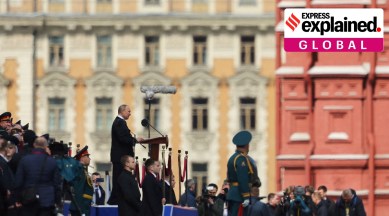Explained: On Victory Day, Vladimir Putin justified invasion of Ukraine. What his speech means
Long-term Russia watchers were struck by two points following the end of Putin’s Victory Day speech: How he gave no indication of Russia’s plans moving forward, and that he made references specifically to Donbas, and not all of Ukraine.

Victory Day in Russia marks the Soviet Union’s triumph over Nazi Germany in 1945. But this year, the May 9 anniversary comes at a time when Russian forces have intensified attacks against Ukraine and Moscow has faced criticism and condemnation for its aggression.
The commemoration of the anniversary also comes at a time when President Vladimir Putin has claimed that the war with Ukraine is similar to the circumstances that the Soviet Union faced when Hilter invaded in 1941. Putin has called Ukrainians “Nazi”-inspired nationalists and projected the war as a battle against these forces.
“Our common duty is to prevent the renaissance of nazism which has brought so much suffering to people of different countries,” Putin had said in a message to the 12 former Soviet republics including Ukraine and Georgia. Ukraine and its allies reject the accusation of nazism in Ukraine and that Russia is fighting for survival against an aggressive West, saying the Kremlin leader unleashed an unprovoked war in an attempt to rebuild the Soviet Union.
What did Putin say
The Kremlin announced that due to inclement weather, the ceremony that would have featured 77 aircraft formation flying over Moscow’s Red Square was cancelled. Analysts had said that this portion of the ceremony would have served as a message, in context of the invasion of Ukraine, because Russia’s defence ministry had announced that the formation would include eight MiG-29 fighters flying in a “Z” formation to show support for Russian troops fighting in Ukraine. The number of tanks and missiles were also fewer than what some analysts had expected.
Putin’s address focused on the nation’s war with Ukraine. He started with a call for a minute of silence, saying, “We bow our heads to the martyrs of Odessa who were burned alive, to the martyrs in Donbas who have died fighting Fascists.” During his address, Putin also drew parallels between the victory during the Second World War and the invasion of Ukraine. “Defending Russia is always sacred. You are fighting for our people in the Donbas, for the security of our motherland,” Putin had said, according to a translation by the Financial Times.
Prior to the parade, analysts had said that one of the goals of this year’s parade was to justify the country’s war with Ukraine, which has gone on for longer than what Russia had anticipated and has cost significantly more. This found mention in his speech when he addressed Russian “aggression” in Ukraine. “NATO didn’t listen to us, they were preparing to attack Crimea….Russia attacked preemptively against aggression,” Putin said.
The speech also included criticism of the United States, during which Putin accused Washington of preventing American veterans of the Second World War from travelling to Moscow to attend the parade.
What analysts have to say about Putin’s speech
Long-term Russia watchers were struck by two points following the end of Putin’s speech: How he gave no indication of Russia’s plans moving forward, and that he made references specifically to Donbas, and not all of Ukraine.
Analyst Ulrich Speck believes that this “makes the war look like a defensive operation- not an operation to conquer all of Ukraine.” Given the setbacks that Russia has witnessed since the start of the invasion in February, Speck believes that this may be an indication that Putin is now limiting his war aims.
The speech ended with no declaration of war or mobilisation of forces, or other forms of aggression, as some analysts had anticipated. There was also no reference to when the invasion might end. Some analysts expressed surprise at the lack of the proclamation of victory for the territories that are under Russian occupation at the moment, for instance, Mariupol.
Newsletter | Click to get the day’s best explainers in your inbox